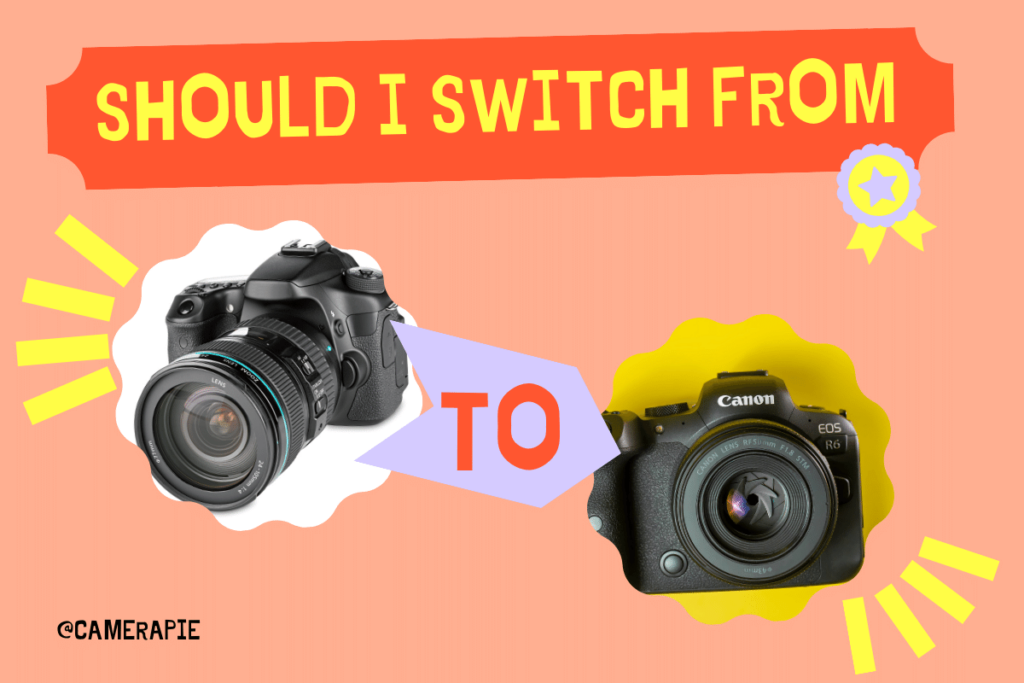
You’ve likely heard the buzz around mirrorless cameras and how they’re shaking up the photography world. But what’s the real difference between your trusty DSLR and these new kids on the block? It’s all about the tech inside—mirrorless cameras ditch the traditional mirror and optical viewfinder for a streamlined design and electronic viewfinders.
So, should you make the switch? It’s not just about jumping on the bandwagon; it’s a decision that could change how you shoot. As a seasoned camera expert and the founder of CameraPie, I’ve seen both sides of the coin. Mirrorless cameras boast portability and speed, while DSLRs offer optical viewfinders and longer battery life. Let’s dive into the details and weigh up the pros and cons to see if a switch is in your future.
Why You Might Want to Switch from DSLR to Mirrorless
Size Does Matter
Have you ever felt the strain on your neck after a long day of shooting with your heavy DSLR? Mirrorless cameras can be a real game-changer here. Without the bulk of a mirror mechanism and optical viewfinder, they’re significantly smaller and lighter. This means more comfort for you and extra space in your bag for lenses or snacks. Just imagine strolling through your favorite city with a Sony A7R IV—you’ll barely feel its presence, yet it packs an incredible 61 megapixels, ensuring your photos are stunningly detailed.
Speed and Accuracy at Your Fingertips
The autofocus technology in mirrorless cameras has evolved by leaps and bounds. They often offer faster and more accurate autofocus systems compared to their DSLR cousins. With most sporting phase-detection pixels right on the sensor, you’ll find that you’re not just snapping photos—you’re capturing moments as they happen, crisp and blur-free.
Let’s Get Dynamic
We’re talking about dynamic range and resolution, the heart, and soul of your images. A mirrorless camera like the Nikon Z6 II not only excels in low-light situations but also gives you astounding versatility. With a higher resolution and dynamic range, your photos will have more detail in the shadows and highlights, breathing life into every shot.
Are We Ready for Our Close-Up?
Video capabilities are a stronghold of mirrorless cameras. If you’re itching to dive into videography or just want to spruce up your vlogs, you’ll adore features like 8K recording, found in beasts like the Canon EOS R5. Not to mention, for those of you who straddle the line between photo and video, hybrid shooters like the Fujifilm X-T4 offer a blend of performance and a stylish, retro look.
A Hotbed of Innovation
One thing’s certain: Mirrorless cameras are at the forefront of photography technology. They’re constantly being updated with the latest features and innovations, giving you an array of creative options at your fingertips. There’s simply more variety to choose from, and whether you’re after the latest tech or distinctive styles, there’s probably a mirrorless camera that’s perfect for your needs.
Why You Might Want to Stick with DSLR
Battery Life That Goes the Distance
You’ve heard the hype about mirrorless cameras, but before you make the jump, let’s chat about a few reasons why your trusty DSLR might still be your best bet. For starters, battery life. DSLRs are the marathon runners in the camera world. They can go on shooting long after many mirrorless cameras would’ve needed a recharge. Perfect for those all-day shoots where you can’t afford to take a break.
Get a Grip
Ever held a DSLR? That larger grip feels like it was molded just for your hand, doesn’t it? It’s comfortable, especially when you’re working those extra-long sessions. Plus, the heft and build of a DSLR give it a kind of indestructible vibe. They’re like the seasoned weightlifters of photography—reliable, sturdy, and up for any challenge.
A Glass for Every Class
When it comes to lenses and accessories, DSLRs have been around the block a few times. This veteran status means there’s a wider selection to choose from, and often at better prices thanks to a mature second-hand market. Mirrorless models are catching up, but DSLRs still hold the trophy for variety and availability.
Don’t Fix What Isn’t Broken
The interface on DSLRs, it’s like coming home. It’s where many photographers cut their teeth, and it just feels right. You might miss that familiarity if you switch, like when you can’t find your favorite old jeans in the closet. Sometimes, what you know works, and it works well.
Case in Point: Tried and True DSLRs
Let’s name names. The Nikon D850? That’s like the Swiss Army knife for pros snapping landscapes or wildlife. Canon EOS 5D Mark IV—a wedding photographer’s best friend. And for the adventurers out there, the Pentax K-1 II won’t bat an eyelash at a little dust or drizzle. As for you sports and action photographers, the Olympus OM-D E-M1X is quick on the draw and doesn’t miss a beat.
These are just a handful of examples where DSLRs have proven their mettle. They’re tried, they’re true, and they’ve been through the photographic battlefields time and time again.
How to Decide Whether to Switch from DSLR to Mirrorless
Deciding whether to switch from a DSLR to a mirrorless camera can feel like you’re standing at a crossroads with your photography journey. Both paths offer unique experiences and it’s essential to consider various factors before taking the leap.
Assessing Your Budget and Investment
Mirrorless cameras can be a hefty investment, especially if you’re eyeing the latest models. Yet, if you’ve got a collection of DSLR lenses and accessories, it’s not just about the camera body—you’ll be investing in new lenses and adapters as well. Check your budget:
- How much are you willing to spend?
- Will you need to buy new lenses or will your old gear suffice with adapters?
- Does the long-term value proposition align with your finances?
Understanding Your Photography Style and Needs
Your shutterbug style plays a crucial role. If you’re into sports photography, you’d want a camera with lightning-fast autofocusing. However, for those serene landscape shots, you might prioritize dynamic range and image quality.
- Are rapid shooting speeds crucial for your work?
- Does a smaller, lighter camera enhance your travel and street photography?
- How will the change affect the quality of your photos?
Gauging Your Learning Curve and Adaptability
Mirrorless cameras boast modern features and improved technology but come with a learning curve. If you’re comfortable with your DSLR, switching might mean relearning certain aspects of shooting.
- Consider the time you’ll need to familiarize with the new system.
- Are you ready to experiment and adapt to potentially unfamiliar menu systems and controls?
Weighing Personal Preference and Satisfaction
Ultimately, the decision is deeply personal. Some photographers swear by the tactile feel and reliability of DSLRs, while others praise the cutting-edge tech of mirrorless cameras.
- Reflect on what brings you joy and satisfaction in photography.
- Are you looking for a new challenge or prefer sticking with what you know?
How to Test and Compare Cameras
Before you make any decisions, get your hands on some mirrorless models.
- Read reviews and ratings by professionals to understand the pros and cons.
- Watch videos and sample photos taken by real users to see the results in action.
- Drop by your local store and test the cameras personally. Nothing beats the hands-on experience.
- Consider renting or borrowing different models for a trial period to gauge how they feel in action.
Conclusion
Deciding whether to switch from a DSLR to a mirrorless camera is ultimately a personal choice. You’ve got to weigh the benefits like size and technology against what you might miss, like battery life and a familiar interface. Remember, it’s not just about the camera body but the lens selection and your budget too. Think about what feels right in your hands and matches your photography style. Don’t rush your decision—take the time to test out both and see which one speaks to you. Trust your instincts, and you’ll make the choice that’s best for your photography journey.
Frequently Asked Questions
What are the main advantages of switching to a mirrorless camera?
Mirrorless cameras offer several advantages, such as a more compact and lightweight design, faster autofocus speed, and higher performance in video recording. They also have electronic viewfinders that can display real-time previews of exposure, white balance, and depth of field.
Why might someone choose to stick with a DSLR camera?
Someone might prefer a DSLR for its long battery life, suitable for all-day shoots, its comfortable grip and sturdy build, and a wider selection of lenses and accessories at better prices. The familiarity of the DSLR interface is also a strong reason for some photographers.
Are DSLR cameras more reliable than mirrorless cameras?
DSLR cameras have a reputation for reliability in various photography genres due to their durable build and long-standing presence in the market. Both DSLR and mirrorless cameras can be reliable; it often depends on the brand and model.
How should one decide whether to switch from a DSLR to a mirrorless camera?
Deciding between a DSLR and a mirrorless camera involves considering factors such as budget, photography style and needs, the learning curve for new technology, personal preference, and satisfaction. It’s also wise to test and compare cameras hands-on before making the switch.
Is the learning curve significant when switching from a DSLR to a mirrorless camera?
The learning curve can vary. Mirrorless cameras may have different menu systems and controls, but the basic principles of photography remain the same. For those already familiar with DSLRs, adapting to a mirrorless system may require a short period of adjustment.

